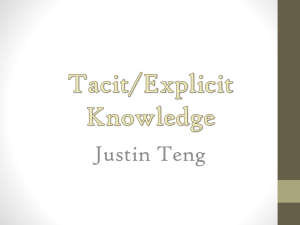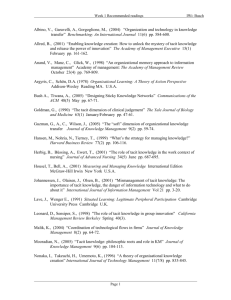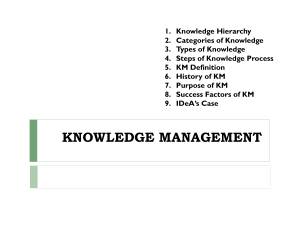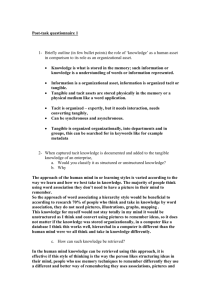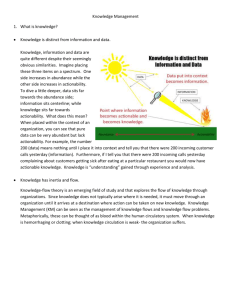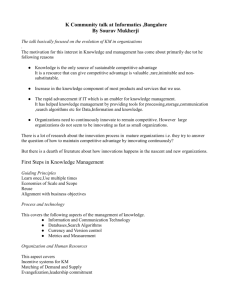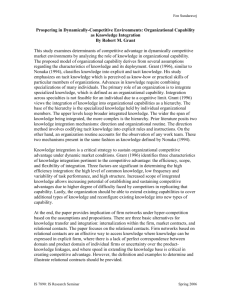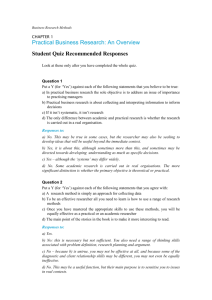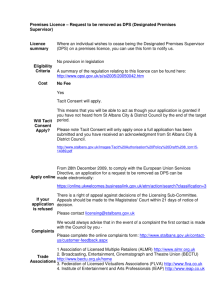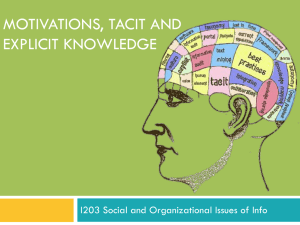Presentation - Bill Garland's Nuclear Engineering Page
advertisement
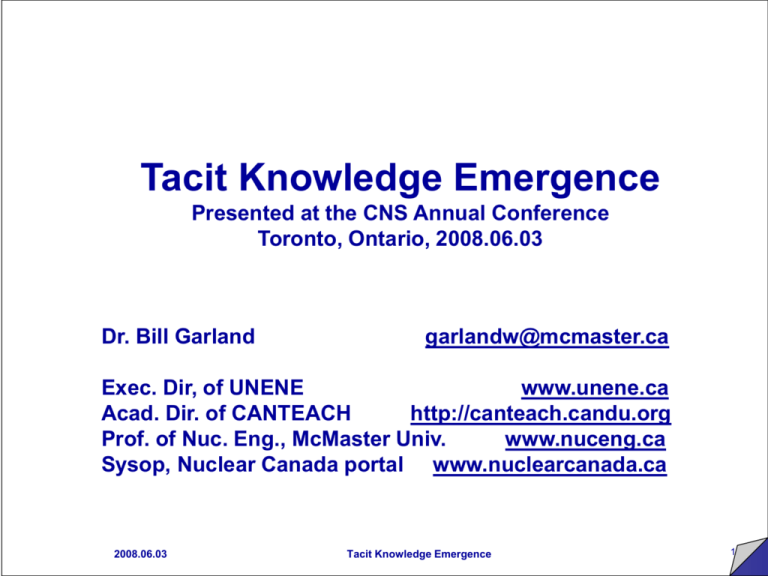
Tacit Knowledge Emergence Presented at the CNS Annual Conference Toronto, Ontario, 2008.06.03 Dr. Bill Garland garlandw@mcmaster.ca Exec. Dir, of UNENE www.unene.ca Acad. Dir. of CANTEACH http://canteach.candu.org Prof. of Nuc. Eng., McMaster Univ. www.nuceng.ca Sysop, Nuclear Canada portal www.nuclearcanada.ca 2008.06.03 Tacit Knowledge Emergence 1 Outline Tacit Knowledge Transfer Failures The Carpenter’s Rule What is Mastery? Who Cares? Industrial Needs. Professional Development CANTEACH, UNENE and all that Stewardship Tacit Knowledge Emergence 2008.06.03 Tacit Knowledge Emergence 2 Definition Tacit Knowledge is “knowledge that we have without knowing we know it and that once we know we know it, it becomes harder to know how we know what we know”. “We know more than we can tell” – Polanyi. [Smith 2003] We learn by doing. Knowledge is not a thing; it is a process. 2008.06.03 Tacit Knowledge Emergence 3 Tacit Knowledge Transfer Failures Review in Norway [Nilsen 2005] reveals: Most efforts at Tacit Knowledge transfer failed. Main conclusion: No consensus on how to do it, what the consequences [of the demographics] might be and what should be done about it. Knowledge assets are not taken into account in financial book keeping [hence not properly valued]. In this room, we are in danger of losing 400x20=8000 person-years of tacit knowledge unless ‘shift happens’. 2008.06.03 Tacit Knowledge Emergence 4 Pop Quiz Think of the things that went very wrong in your organization in the past. Isotope business, MAPLE, feeder thinning, Darlington fuel failures, Pt. Lepreau plywood dam, Bruce A drum humping, …. Main cause? • Lack of explicit scientific and engineering knowledge? Lack of research? • Or improperly implemented knowledge? 2008.06.03 Tacit Knowledge Emergence 5 What was learned in Norway? Knowledge is not really the asset, but the people owning the knowledge and able to exploit it are the asset. Knowledge is not only explicit, but also implicit and tacit, actually it could happen that the most valuable knowledge is tacit and so people started to suggest that an important part of knowledge could never be codified. Knowledge is extremely dynamic, technology often ended in creating repositories difficult to update. Instead of managing knowledge it is necessary to look at the knowledge process. 2008.06.03 Tacit Knowledge Emergence 6 The Carpenter’s Rule A carpenter’s journey Rural upbringing, little formal education Worked with a perfectionist An apprentice’s journey Urban upbringing Higher level education Tacit knowledge is not so much ‘transferred’ as it ‘emerges’. Mastery cannot be cloned. How long does it take and how much time do we have? 2008.06.03 Tacit Knowledge Emergence 7 Master your profession… How long does it take? About 10 years. And how much time do we have? The average experienced person in this room has about 10 years left. They are not available to mentor. We have not articulated what we need to transfer, we don’t know how to do it and we have little time anyway. That, I suppose is the challenge that this session is referring to. 2008.06.03 Tacit Knowledge Emergence 8 What is that Mastery mindset? It’s that feeling and mindset when you are ‘into’ whatever you are doing and lose track of time. You enjoy the process and it is more like play than work. People talk of being in the groove in the sweet spot in the zone in the flow The literature refers to this as ‘Flow: the optimal experience’ This is joy. It applies to human interaction as much as it does to work and play activities. 2008.06.03 Tacit Knowledge Emergence 9 Be in the now Focus on the job at hand • Need to remove distractions Proceed at the optimal pace complexity How to get the flow experience? • Too slow and you get bored • Too fast and you get overwhelmed Strive for quality • Master the task at hand ability So this is what you do: proceed with a sense of quality. Care. More than anything else, it is a state of mind. 2008.06.03 Tacit Knowledge Emergence 10 Some people learn slower than others. Some people have lower ultimate capability than others. But a slower person can have higher ultimate capability. Often, a person is slower because he or she is thinking more deeply. It takes time to integrate new ideas into what you already know and believe. So don’t be swayed off your path by the apparent speed of others. competency The tortoise and the hare Time on task 2008.06.03 Tacit Knowledge Emergence 11 When are people motivated? 2008.06.03 Tacit Knowledge Emergence 12 How this relates to learning Need to set up an environment and a mindset conducive to learning. Need time to learn Space out the classes to give you time to think and integrate the new ideas into your current understanding. Use e-classroom to bridge the gap between infrequent marathon sessions necessitated by geography. Master the pre-requisites Take refresher courses. Use the e-classroom and online courses. Self-paced with checkouts. Build your confidence. Mentorship and apprenticeship Work with someone more experienced if you can. 2008.06.03 Tacit Knowledge Emergence 13 How this relates to the workplace At work, you have goals and objectives to achieve. In ‘goal mode’ you work toward a future goal. Enjoyment comes for that brief period after attaining the goal and before you realize that the next goal awaits. That is a depressing and draining way to live. The irony is that mastery mode gives better results in the long term. Mastery is empowering and energizing. There is nothing to stop you from working toward goals while mastering the techniques and carrying out the tasks needed. Important side effects: This is contagious – others will sense it and value it. Remember, your company is seeking quality work and will reward quality. 2008.06.03 Tacit Knowledge Emergence 14 What’s the education situation? Nuclear Education Program Graduate Program (research) Teaching Material Undergraduate Program Reactor Physics Industry courses and manuals, incl CANTEACH teaching material used for both ugrad and grad level courses University course notes Reactor Physics Systems Eng Systems Engineering Industry utilities and consultants need mostly traditional engineers, systems engineers and a few reactor physicists AECL and other consultants Health Physics and Medical Physics Health Physics and Medical Physics Mech, chem, elect OPG, HQ, NBPower, British Nuc and other utilities Mech, chem, elect, ... Engineering Professional Accreditation Diploma / 1 year upgrade 2008.06.03 Tacit Knowledge Emergence 15 What’s the problem? Professionals come from the universities Inadequate preparation for industry Research emphasis over development and teaching Lack of systems approach Self-reinforcing myopia No upgrade path for C students Grades not a good measure of the person System shuts out and destroys people University is not going to change its mandate or structure for industry It is answerable to the public, not to industry 2008.06.03 Tacit Knowledge Emergence 16 Where is industry in all this? Industry is faced with a huge hiring and expertise gap problem They can ill afford the training cost Industry time horizon is too short Industry cannot give accredited courses Big mismatch between what industry needs and what universities supply 2008.06.03 Tacit Knowledge Emergence 17 What do we need? We are not going to change industry or the university mandates Therefore, need Access to information Professional development upgrade path Access to mentors and apprenticeship Better measures of the person Remedial programs Bridging programs And it all needs to be (and can be) done with a Mastery mindset. 2008.06.03 Tacit Knowledge Emergence 18 Opening Supply Pathways PEO Nuclear Engineering Syllabus prepared and accepted May 22, 2008 Degree standardization globally WNU Academic Council (UNENE is a member) International networking WNU Summer Institute National networking Get involved with the CNS What else can we do? Let’s look at some of the things already underway. 2008.06.03 Tacit Knowledge Emergence 19 Canadian Initiatives In Canada, we have these uncoordinated nuclear elements: • CANTEACH – an open CANDU document repository (2001) • UNENE – a nuclear centre of excellence (2002) • NUCENG – an university based portal and repository (1998) • CNS – a society of nuclear individuals (conferences, bulletin, …) (1979) • COG – an industrial consortium of operators and designers (1984). Sponsors CANTEACH and member of UNENE • OCI - provides a forum for exchange of information related to technical and quality issues with particular regard to the potential impact of such issues on the supply base for its members' products and services. • Nuclear Canada portal – a wiki based portal to the Canadian Nuclear Enterprise. 2008.06.03 Tacit Knowledge Emergence 20 Existing Networks UNENE – University Network of Excellence in Nuclear Engineering, Canada (2002) WNU - World Nuclear University (2003) ENEN - European Nuclear Education Network (2003) ANENT - Asian Network for Education in Nuclear Technology (2004) NTEC - Nuclear Technology Education Consortium (UK) (2005) RANSE - Russian Association of Nuclear Science and Education (2005) 2008.06.03 Tacit Knowledge Emergence 21 CANTEACH Justification Why we need CANTEACH Access to information 2008.06.03 is required for Education and Training This underpins all we do. CANTEACH The Web Expertise gap due to: - early expansion, - then stagnation, - then retirements. Intellectual Capital = Key Asset CANDU Docs Tacit Knowledge Emergence The focus is on education and training in the fundamentals, not in trade secrets 22 2008.06.03 Tacit Knowledge Emergence 23 How do we do what we need to do? Nuclear Education Program Graduate Program (research) Teaching Material Undergraduate Program Reactor Physics Industry courses and manuals, incl CANTEACH Reactor Physics teaching material used for both ugrad and grad level courses University course notes Systems Eng Systems Engineering Industry utilities and consultants need mostly traditional engineers, systems engineers and a few reactor physicists AECL and other consultants Intellectual Capital = Key Asset Why we need CANTEACH Access to information Health Physics and Medical Physics Health Physics and Medical Physics Mech, chem, elect OPG, HQ, NBPower, British Nuc and other utilities Mech, chem, elect, ... Engineering This underpins all we do. CANTEACH The Web is required for CANDU Docs Expertise gap due to: - early expansion, - then stagnation, - then retirements. Education and Training The focus is on education and training in the fundamentals, not in trade secrets Professional Accreditation Diploma / 1 year upgrade 2008.06.03 Tacit Knowledge Emergence 24 Some questions for you Who are the stewards of the discipline? What are we as individuals trying to do? Be the best artists? Or are we trying to further the art? What mindset will enable Tacit Knowledge to emerge? I think it is the Mastery mindset. Proceed with a sense of quality. 2008.06.03 Tacit Knowledge Emergence 25 2008.06.03 Tacit Knowledge Emergence 26 Questions? Dr. Bill Garland garlandw@mcmaster.ca Exec. Dir, of UNENE www.unene.ca Acad. Dir. of CANTEACH http://canteach.candu.org Prof. of Nuc. Eng., McMaster Univ. www.nuceng.ca Sysop, Nuclear Canada portal www.nuclearcanada.ca 2008.06.03 Tacit Knowledge Emergence 27 Further reading… Smith, M. K. (2003) 'Michael Polanyi and tacit knowledge', the encyclopedia of informal education, www.infed.org/thinkers/polanyi.htm. "Knowledge Management in Nordic NPPs: Summary report of the findings from the workshop", by Svein Nilsen, Institute for Energy Technology, Halden, Norway, Nordic nuclear safety research, NKS-102, ISBN 87-7893-161-4, April 2005. http://www.nks.org/nordisk/R-delen/resultater.htm “Flow: The Psychology of Optimal Experience” by Mihaly Csikszentmihalyi found at http://www.siliconyogi.com/andreas/it_professional/sol/ complexsystems/FlowThePsychologyofOptimalExperience.html “Mastery: the Keys to Success and Long-term Fulfillment” by George Leonard found at http://www.vnoel.com/content/view/137/54/ 2008.06.03 Tacit Knowledge Emergence 28 CANTEACH Target Audience Mission To preserve technical knowledge of CANDU nuclear-electric generating system for use by present and future members of the CANDU community. Mission To train Highly Qualified Personnel. Thus target audience is primarily at the level of the working professional. NOTE: This target, as it turns out, leads to the identification of a serious problem that needs to be addressed. Aimed at capturing Know-how and Know-why. 2008.06.03 Tacit Knowledge Emergence 29 CANTEACH Justification Why we need CANTEACH Access to information 2008.06.03 is required for Education and Training This underpins all we do. CANTEACH The Web Expertise gap due to: - early expansion, - then stagnation, - then retirements. Intellectual Capital = Key Asset CANDU Docs Tacit Knowledge Emergence The focus is on education and training in the fundamentals, not in trade secrets 30 CANTEACH Web Site Tour http://canteach.candu.org 2008.06.03 Tacit Knowledge Emergence 31 UNENE University Network of Excellence in Nuclear Engineering CANTEACH is about info. Low budget ($100k/yr) UNENE is about delivery ($3M/yr). UNENE generates Highly Qualified Personnel. Hope to make CANTEACH the repository for UNENE. 2008.06.03 Tacit Knowledge Emergence 32 What is UNENE? UNENE = University Network of Excellence in Nuclear Engineering UNENE is an industry driven alliance of prominent Canadian universities and nuclear industry 2008.06.03 Tacit Knowledge Emergence 33 UNENE has three distinct objectives: Enhance the supply of highly qualified graduates in nuclear engineering and technology. Reinvigorate university-based research and development in nuclear engineering and technology focusing primarily on mid to longer term research. Create a group of respected, universitybased, nuclear experts for public and industry consultation. 2008.06.03 Tacit Knowledge Emergence 34 Current Industry Membership Ontario Power Generation (OPG) Bruce Power (BP) Atomic Energy of Canada Limited (AECL) CANDU Owners Group (COG) Canadian Nuclear Safety Commission (CNSC) Nuclear Safety Solutions (NSS) 2008.06.03 Tacit Knowledge Emergence 35 University Members McMaster University Queen’s University University of Toronto University of Waterloo University of Western Ontario University of Ontario Institute of Technology Ecole Polytechnique University of New Brunswick Royal Military College University of Guelph 2008.06.03 Tacit Knowledge Emergence 36 First Phase Funding Cash Funding (first phase) Industry: Universities: NSERC: $ 7.8 M $ 0.81 M $ 7.12 M (estimated) (Not including other nuclear research chairs and programs) Other In-kind Support: Industry and Universities: $4.97M Total impact ≥$20.7M 2008.06.03 Tacit Knowledge Emergence 37 2008.06.03 Tacit Knowledge Emergence 38 UNENE Web Site Tour http://www.unene.ca 2008.06.03 Tacit Knowledge Emergence 39 NucEng Nuclear Engineering at McMaster University+ CANTEACH is about info. UNENE is about delivery. NucEng is about students. • Courses • Who’s Who • Careers • Links • Forums and List servers 2008.06.03 Tacit Knowledge Emergence 40 NucEng Web Site Tour http://www.nuceng.ca 2008.06.03 Tacit Knowledge Emergence 41 CNS Canadian Nuclear Society CANTEACH is about info. UNENE is about delivery. NucEng is about students. CNS is about professionals as individuals. • Seminar type courses • Conferences • Fellowship and contacts • Forums and List servers 2008.06.03 Tacit Knowledge Emergence 42 CNS Web Site Tour http://www.cns-snc.ca 2008.06.03 Tacit Knowledge Emergence 43 COG CANDU Owners Group CANTEACH is about info. UNENE is about delivery. NucEng is about students. CNS is about professionals as individuals. COG is about industrial partnerships in R&D • Shared R&D cost • Shared R&D facilities • Creation of and access to closed information databases 2008.06.03 Tacit Knowledge Emergence 44 COG Web Site Tour www.candu.org 2008.06.03 Tacit Knowledge Emergence 45 OCI – Organization of CANDU Industries http://www.oci-aic.org/ 2008.06.03 Tacit Knowledge Emergence 46 Nuclear Canada Portal www.nuclearcanada.ca 2008.06.03 Tacit Knowledge Emergence 47 Where does the portal fit in? The portal needs to provide access to information on Documentation (technical and otherwise) • Education and training based Education and training programs • Emphasis on professional development Information on education and training opportunities such as • Scholarships • Reciprocal agreements and exchanges • Etc. Promotion of International accreditation • Provide information on what we should measure, etc. Web enabled learning 2008.06.03 Tacit Knowledge Emergence 48
